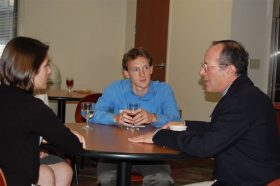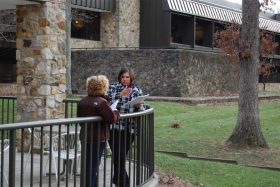Through an intensive "Lawyering, Leadership and Professionalism" course in January, first-year Elon Law students gathered insights from lawyers across North Carolina about their concepts of leadership in the law and their strategies for success in the profession.
Through the course, law students formed into twelve law firms, conducting interviews and roundtable discussions with lawyer-leaders from Greensboro and Raleigh-Durham communities primarily.
Student firms then presented lessons learned from the interviews through group presentations. Those presentations also explored the value of leadership education in law schools and the importance of lawyers who contribute to community and public interests. In addition to the presentations, each of the student firms also submitted a formal report detailing their perspective on Lawyer Leadership.
Law student Ashley Clark said she was inspired by the experience.
“The lawyer we spoke with was not only running her own small firm, she was also juggling family responsibilities and a range of philanthropic endeavors,” Clark said. “Her commitment to her staff and to doing an excellent job for her clients was remarkable. Her professional success, while maintaining an active personal life and keeping a healthy work-life balance was what was most impressive to me.”

A panel of judges reviewed each group presentation and identified two student firms as winners of the “Lessons of Experience” project.
Group winners are identified below:
Student Firm: Clark, Furr and Garner, comprised of law students Danielle Appelman, Melissa Apperson, Chris Avery, Amy Brodland, Ashley Clark, Collin Cooper, Jim Grant, Mathew Kraus, Jill Kirshner, and Savannah Mangum.
Student Firm: The Prestige, comprised of law students Tara Austin, Hamza Benzine, Alvaro de la Calle, Krystle Deus, Tiffany Gray, Michael Heck, Jonathan Horner, Johanna Knight, Josh Lopez, Julie Stainback, Kathy Stewart, and Mark York.
The Prestige firm focused its presentation on the power of positive influence and action in service to others. During their presentation, the firm challenged fellow students and Elon Law faculty to contribute to Nothing But Nets, a global, grassroots campaign to raise awareness and funding to combat malaria, one of the largest killers of children in Africa. In a span of twenty-five minutes, the firm was able to raise $532.00 for the campaign.

“We wanted to show our fellow students how easy it is to get involved and give back to others in need,” said Jonathan Horner. “Nothing But Nets is a great campaign. A simple donation of ten dollars buys one net to prevent malaria in Africa. In less than twenty-five minutes, the student body was able to buy 53 nets, saving 53 people from Malaria.”
In addition to gaining valuable insights from interviews with lawyers in North Carolina, students in the course traveled to the Center for Creative Leadership (CCL) to participate in a program titled “Leadership Essentials for Lawyers.”
With 14 different programs worldwide, including a training center in Greensboro, CCL focuses exclusively on leadership education and research, with expertise in solving the leadership challenges of individuals and organizations globally.
During the two-day program with Elon Law, students focused on values, ethics and professionalism.
Law student Marina Emory said the experience was invaluable.
“I enjoyed the small class setting and was able to use CCL’s resources to learn more about myself, my leadership style and the values that are most important to me,” Emory said. “The exercises definitely made me refocus on the key elements of my life that are most important, and helped me see how to incorporate these values into being an ethical leader.”
Roland Smith, Professor of Leadership at Elon Law, taught the course. He is also a senior faculty member at the Center for Creative Leadership, leading CCL’s legal sector practice group.
Smith said that in addition to providing students with the opportunity to explore key concepts and to practice essential lawyering skills, the ‘Lawyering, Leadership and Professionalism’ course provided students with exposure to critical interpersonal competencies and leadership skills that are essential for success.
“Self-awareness and skills analysis are key for understanding strengths and vulnerabilities,” Smith said. “Having first-year law students evaluate themselves against established predictors of lawyering success enables them to consider and refine personal and professional goals early on in law school.”
Smith also said he thought the course would help law students contribute to the profession and to their communities in significant ways immediately upon graduation and throughout their careers.
“The course enters law students into conversation with a broad cross-section of practicing lawyers, allowing students to consider a range of strategies and techniques for success in the profession and in their civic lives, ” Smith said.



